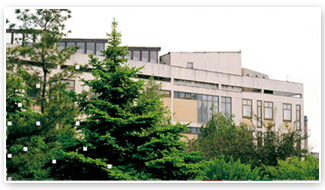
The Institute for Biological Research "Siniša Stanković" (IBISS) is a leading multidisciplinary scientific institution in the field of biological sciences in Serbia. Its establishment was made possible by consolidating the entire scientific potential in the biological sciences in Serbia after World War II, along with developing its scientific staff. The idea of creating a research institution dedicated to biological sciences emerged at the end of 1946. The Serbian Academy of Sciences proposed to the Government of the National Republic of Serbia the establishment of the Institute, which it would manage. In January 1947, the Serbian Academy of Sciences convened a conference of biologists to assess the feasibility and necessity of establishing a Biological Institute. The conference concluded that creating the Institute of Biology would significantly stimulate scientific work in the field and outlined its tasks. The Serbian Academy of Sciences accepted the conference's proposal, deciding to establish three separate institutes due to the broad scope of tasks: the Institute for Ecology and Biogeography, the Institute for Developmental Physiology, Genetics and Selection, and the Institute for Parasitology.

The formal decision to establish the Institute for Ecology and Biogeography and the Institute for Developmental Physiology, Genetics and Selection was made on May 31, 1947, by decision of the Serbian Academy of Sciences no. 563. These institutes formed the foundation of the future Institute for Biological Research "Siniša Stanković." By a regulation on institutions with independent financing, these institutes officially left the Serbian Academy of Sciences' composition and switched to independent financing by decisions of the Executive Council of the People's Republic of Serbia on March 27, 1954.
The institutes continued their work, and on May 9, 1956, they were merged into one institute under the name Biological Institute, marking the beginning of the integration of basic scientific research in biology in Serbia. On March 25, 1961, a new decree established the Institute of Biology, with the Executive Council of the National Assembly of NRS and the University of Belgrade jointly declared as the founders. The goal was to unify all basic biological research in Serbia.

In 1968, the institute was renamed the Institute for Biological Research. In 1974, it received its current name, the Institute for Biological Research "Siniša Stanković," in honor of its long-time director and in recognition of his work.
The Institute first acquired the status of an institute of national importance for Serbia by the decision of the Government of the Republic of Serbia No. 022-2939/2018 on March 29, 2018, published in the "Official Gazette of the RS" No. 39 2018. This status was confirmed by the Government of the Republic of Serbia No. 022-12273 of 2021, published in the "Official Gazette of the Republic of Serbia" No. 132/2021, in accordance with the Law on science and research, for ten years. The Institute has remained state-owned since its founding.
The Institute focuses on fundamental and multidisciplinary research across various biological disciplines, including biochemistry, molecular biology, cytology, animal physiology, plant physiology, neurobiology, neurophysiology, immunology, genetics, ecology of aquatic and terrestrial ecosystems, environmental protection, taxonomy, and organic evolution.
 Another crucial activity of the Institute is the continuous education and training of scientific research personnel. This includes training young researchers through various scientific activities and realizing numerous graduate, postgraduate, and doctoral theses. As a member of the University of Belgrade, the Institute's associates participate in teaching basic, postgraduate, and doctoral studies. This contributes to improving the quality of teaching at related faculties of the University of Belgrade and facilitates the exchange of knowledge and the creation of a model for the interaction between science and education in Serbia.
Another crucial activity of the Institute is the continuous education and training of scientific research personnel. This includes training young researchers through various scientific activities and realizing numerous graduate, postgraduate, and doctoral theses. As a member of the University of Belgrade, the Institute's associates participate in teaching basic, postgraduate, and doctoral studies. This contributes to improving the quality of teaching at related faculties of the University of Belgrade and facilitates the exchange of knowledge and the creation of a model for the interaction between science and education in Serbia.
The Institute also focuses on national priorities in science and technology and transfers basic research results to fields where biology is fundamental, such as medicine, pharmacy, veterinary medicine, biomedicine, forestry, environmental protection, agriculture, and biotechnology.
IBISS uses analytical cookies to analyze the use of the site in order to improve the user experience, by clicking "Accept" you consent to the use of cookies.